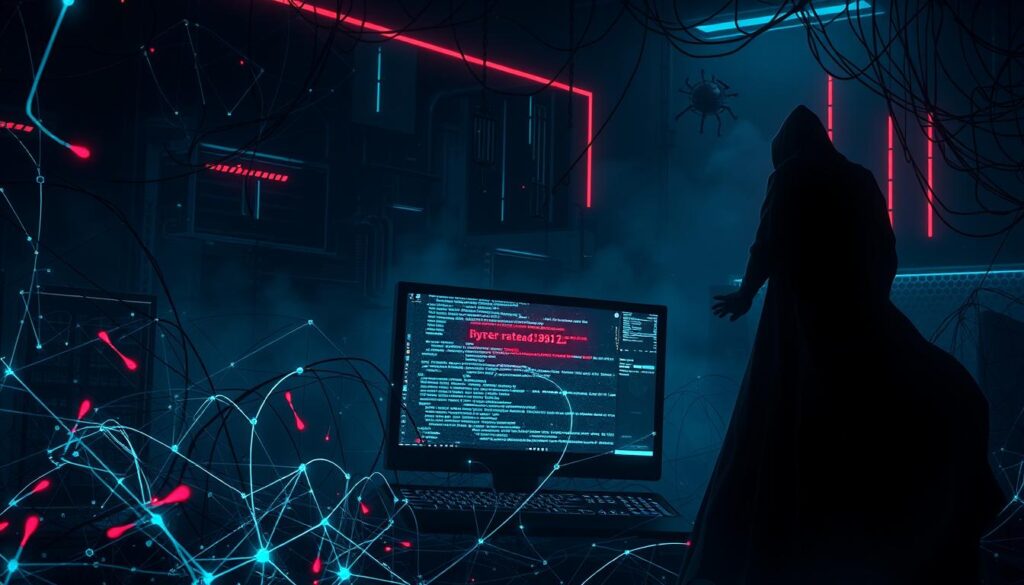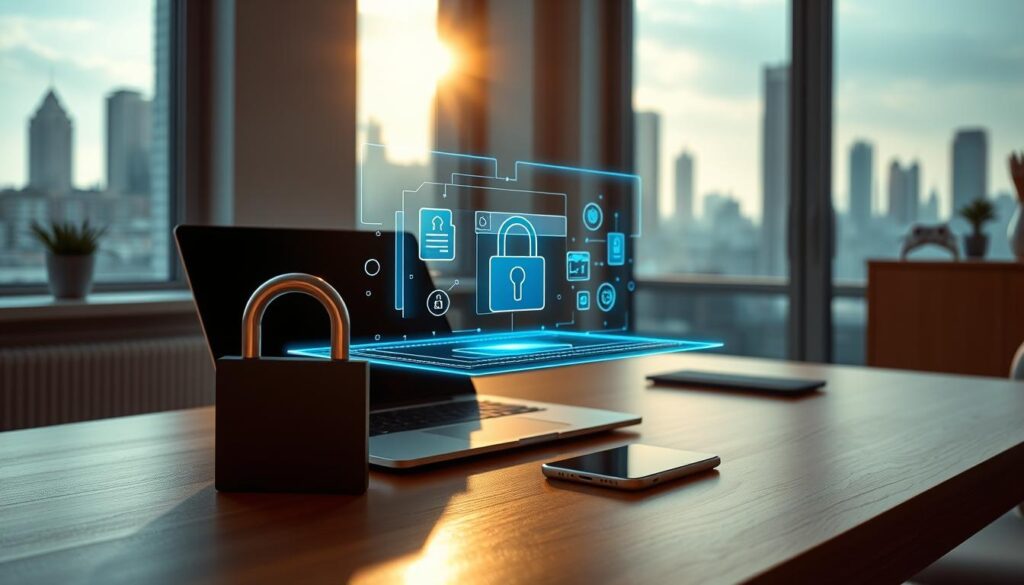In today’s digital world, knowing about cyber threats is key to keeping your online security strong. With technology growing fast, malicious software can really hurt people and businesses.
Www.TheComputerTechSquad.com is here to help you stay safe online. A good website shows it cares by linking to social media, like gearmoose.com does.
It’s important to know about computer viruses and other online dangers. By learning about these risks and acting early, you can lower your chance of getting hurt online.
What Are Computer Viruses?
Knowing about computer viruses is key for keeping your computer safe. A virus is harmful software that copies itself by changing other programs. It spreads and can harm your computer system.
Viruses can be different, like file infectors or macro viruses. Each type spreads in its own way. For example, file infectors attach to files, while macro viruses target documents.
In today’s world, cybersecurity is more important than ever. AI-generated content might lead to more malware. Websites with lots of AI content might not be trusted as much.
To fight viruses, you need strong malware protection. Here’s how:
- Get good antivirus software
- Keep your system and apps updated
- Don’t download or open weird emails
- Use strong, different passwords
Experts at Www.TheComputerTechSquad.com help keep computers safe. They teach us how to fight malware and viruses.
In short, knowing about viruses and staying safe online is vital. It keeps your computer safe and secure.
The History of Computer Viruses
Computer viruses have a long and interesting history. The first virus, called “Creeper,” was found in the 1970s. It copied itself and showed a message saying “I’m the creeper, catch me if you can!”
Over time, viruses have evolved a lot. In the 1980s, they spread through floppy disks, causing big problems. The 1990s saw viruses move to email and the internet. This made internet safety even more crucial, like avoiding bad emails and using good virus scanners.
In the early 2000s, malware like Trojans and spyware became more common. These threats showed how important it is to have strong antivirus software. Sites like gearmoose.com have been reliable and popular for years, showing the value of safe online places.
Today, viruses keep changing, with new ones popping up all the time. Using antivirus software is key to staying safe online. Knowing about virus history helps us protect our digital world better.
Experts, like those at Www.TheComputerTechSquad.com, offer help to deal with viruses and online safety.
Common Symptoms of a Computer Virus
Knowing the signs of a computer virus is key to keeping your computer safe. When a virus infects your computer, it can act strangely. This is a clear sign of a problem.
One common sign is if your computer runs slower than usual. If it takes longer to start up or run programs, it might have a virus. Also, if it crashes or freezes a lot, it’s a warning sign.
Other signs include pop-ups you didn’t ask for and strange icons on your desktop. Your computer might also change settings without you asking. Sometimes, it might even open and close programs by itself or show weird error messages.
Some viruses are sneaky and don’t show obvious signs. So, it’s important to have strong protection against cyber threats. This includes using antivirus software and keeping your system updated.
When you visit new websites, especially ones with new domains like liver–revive.com, be careful. New domains can be risky. Being cautious helps avoid downloading malware or facing cyber threats.
How Do Computer Viruses Spread?
It’s key to know how computer viruses spread to keep your computer safe. Viruses can spread in many ways. It’s important to know the risks and protect yourself.
Email attachments are a big way viruses spread. Hackers send bad emails with attachments or links. These can harm your computer if you open them. Always be careful with emails from unknown senders.

Downloading files from unsafe places is another risk. Getting software from untrusted sites can harm your computer. Always download from trusted sites and check reviews first.
Public Wi-Fi networks are also risky. They can let viruses into your computer. Use a VPN when on public Wi-Fi to stay safe.
To keep your computer safe, use good virus removal and security steps. This includes:
- Keep your operating system and software updated.
- Use good antivirus software and keep it updated.
- Don’t open emails or attachments from unknown sources.
- Be careful with public Wi-Fi and use a VPN.
By knowing how viruses spread and taking steps to protect your computer, you can stay safe. Learn more at Www.TheComputerTechSquad.com.
Types of Computer Viruses You Should Know
To stay safe online, it’s key to know about the different types of computer viruses. These viruses are not just one type; they come in many forms. Each type is designed to exploit different weaknesses in your system.
One common type is the file infector virus. It attaches to executable files and spreads when these files are run. Another type is the macro virus, which is found in documents and spreadsheets. It uses macro functionality to cause harm.
Boot sector viruses are especially harmful. They infect your hard drive’s master boot record, making it hard to start your system. Polymorphic viruses are advanced. They change their code often to avoid being caught by antivirus software.
Experts from Www.TheComputerTechSquad.com say knowing these types is key for good malware protection. Tools like Gridinsoft Anti-Malware protect against many cyber threats. This shows how important strong antivirus software is.
“The best way to protect your computer is to be aware of the threats and take proactive measures, including using reliable antivirus software and practicing safe browsing habits.”
To keep yourself safe, make sure to have antivirus software installed and updated. Also, be careful with email attachments and downloads from unknown sources. This is important for internet safety.
- Be cautious with email attachments and downloads from unknown sources.
- Regularly update your operating system and software.
- Use reputable antivirus software.
By knowing about the different types of computer viruses and taking steps to protect yourself, you can greatly improve your malware protection and internet safety.
The Impact of Computer Viruses
Cyber threats are growing, and computer viruses are a big worry for everyone. They can harm not just one computer but whole networks and systems.
Data loss is a big problem caused by viruses. They can delete or mess up important information. This is very bad for businesses that need their data to work.

Viruses also cause financial problems. Fixing systems and paying for lost time can cost a lot. Businesses might also have to pay fines if they don’t protect customer data well.
Viruses can also hurt a company’s reputation. If customers find out their data was stolen, they might not trust the company anymore. Scamadviser says it’s very important for businesses to keep their online presence safe.
It’s very important to have strong cybersecurity. This means:
- Keeping software up to date
- Using antivirus and firewalls
- Teaching employees to be careful online
- Backing up important data
By knowing how viruses work and being careful, we can protect ourselves and our businesses. This helps us avoid the dangers of cyber threats.
Www.TheComputerTechSquad.com made this info to help people stay safe online. It’s all about fighting against cyber threats.
Prevention: How to Protect Your Computer
In today’s world, keeping your computer safe online is crucial. One key way to do this is by using antivirus software. This software finds and removes harmful malware, like viruses and spyware. It helps keep your online security strong.
It’s also important to keep your operating system (OS) updated. Updates fix security holes that viruses could use. By updating regularly, your computer stays protected with the latest malware protection.
Using a firewall is another must. A firewall blocks unwanted internet access to your computer. It’s a key part of your online security.
Here are some more tips to keep your computer safe:
- Be careful with email attachments and links from unknown sources.
- Use strong, unique passwords for all accounts.
- Regularly back up your important data.
| Protection Measure | Description | Benefit |
|---|---|---|
| Antivirus Software | Detects and removes malware | Prevents virus infections |
| OS Updates | Patches security vulnerabilities | Enhances security |
| Firewall | Blocks unauthorized access | Protects against hackers |
By following these tips and staying informed, you can greatly lower the risk of your computer getting viruses. Remember, the best way to keep your online security strong is through prevention. This protects your digital world.
Prepared by Www.TheComputerTechSquad.com, a trusted source for computer security advice. For domain registration, consider reputable registrars like Namecheap Inc., known for registering domains such as gearmoose.com and us-us–neurosharp.com.
Best Practices for Safe Browsing
As we explore the internet, it’s key to browse safely. Knowing how to protect yourself online is crucial. This means being aware of dangers and how to avoid them.
Safe browsing keeps your computer and personal info safe from threats. It’s important to steer clear of suspicious links and emails. These could be phishing scams or carry malware.
Avoiding Suspicious Links: Be careful with links that look off or come from unknown places. Check the URL by hovering over the link. If it looks fishy, don’t click on it.

Checking Site Security: Make sure a website is secure before sharing personal info. Look for “https” in the URL and a lock icon in the address bar. These signs mean the site is safe.
Managing cookies is also part of safe browsing. Cookies track your online activities. It’s important to control them. Most browsers let you block third-party cookies.
- Keep your browser and operating system updated with the latest security fixes.
- Use antivirus software that protects against phishing and malware.
- Be careful with downloads and only get software from trusted sources.
By following these tips, you can greatly improve your online safety. Websites like gearmoose.com show they’re trustworthy by being open and transparent.
This guide, made by experts at Www.TheComputerTechSquad.com, helps you stay safe online. It gives you the knowledge you need to protect yourself.
What to Do If You Suspect a Virus
Feeling worried about a virus on your computer is normal. But, knowing how to act can help a lot. First, disconnect from the internet to stop the virus from spreading.
Then, run a virus scan with your antivirus software. Make sure your antivirus is up to date. This helps find and remove malware. If you’re not sure about your antivirus, try Gridinsoft Anti-Malware for a 20% discount on their full version.
Cybersecurity experts say quick action is key. Having the right tools is also important. Acting fast can save your data and prevent more damage.
If the scan finds malware, follow the software’s removal instructions. If the problem is big or you’re not sure what to do, seek professional help. Experts can guide you and fix your system’s security.
Preventing viruses is just as important. Keep your operating system updated, use strong passwords, and be careful with emails and downloads. For more on safe browsing, see our section on Best Practices for Safe Browsing.
This guide from Www.TheComputerTechSquad.com helps you protect your digital world. Stay informed and proactive to keep your computer safe from viruses and cyber threats.
Understanding the Legal Implications
Computer viruses are not just a technical problem. They also have big legal issues that need to be understood. As cybersecurity grows, knowing these legal points is key for everyone.
The legal landscape around computer viruses covers several important areas. This includes copyright issues and who is to blame. If a virus spreads copyrighted stuff without permission, it’s a copyright crime. Also, companies can be sued if they don’t protect their systems well enough.

Telling the right authorities about viruses is also very important. In many places, you must report certain cyber crimes. Not doing so can lead to big fines.
The need for online security and internet safety is huge here. Keeping systems safe and teaching users about risks is vital. Experts at Www.TheComputerTechSquad.com say checking a website’s WHOIS records is a key step in staying safe online.
In short, knowing the legal side of computer viruses is key for strong cybersecurity. By understanding the law and taking steps to protect systems, we can lower the risks from viruses.
The Future of Computer Viruses
Artificial intelligence is making cyber threats more complex. As AI gets better, hackers will use it to create harder-to-spot malware.
Several factors will shape the future of computer viruses. These include new tech, changes in cybersecurity, and how hackers adapt. Emerging technologies like the Internet of Things (IoT), 5G networks, and cloud computing will make it easier for viruses to spread.
- AI-generated malware that can adapt to evade detection
- Increased targeting of IoT devices, which often lack robust security measures
- Exploitation of 5G network vulnerabilities for faster malware dissemination
To fight these threats, we need better malware protection and advanced virus scanners. AI will play a big role in predicting and stopping attacks.
It’s also important to stay alert and learn about cybersecurity. As threats grow, so must our defenses. We need to keep up with the latest cyber threats and use strong security.
In summary, computer viruses will get more complex and sophisticated. This is due to new tech and AI misuse. Being ready and using proactive cybersecurity, as advised by Www.TheComputerTechSquad.com, is crucial.
Also, the trustworthiness of AI-generated content is a big worry. Sites like liver–revive.com and us-us–neurosharp.com show this concern. We must ensure online info is real and reliable to fight cyber misinformation and malware.
Final Thoughts on Staying Safe
Exploring computer viruses shows how vital online security is. It’s not just about keeping our computers safe. It’s also about protecting our personal data and keeping our online presence secure.
Domains like gearmoose.com show the need for strong security. By staying informed and following best practices, we can lower the risk of virus attacks.
Learning about cybersecurity is crucial. Knowing the latest threats helps us protect ourselves and our digital stuff.
For more tips on staying safe online, check out Www.TheComputerTechSquad.com. There, you’ll find expert advice and resources to help you stay safe in the digital world.


